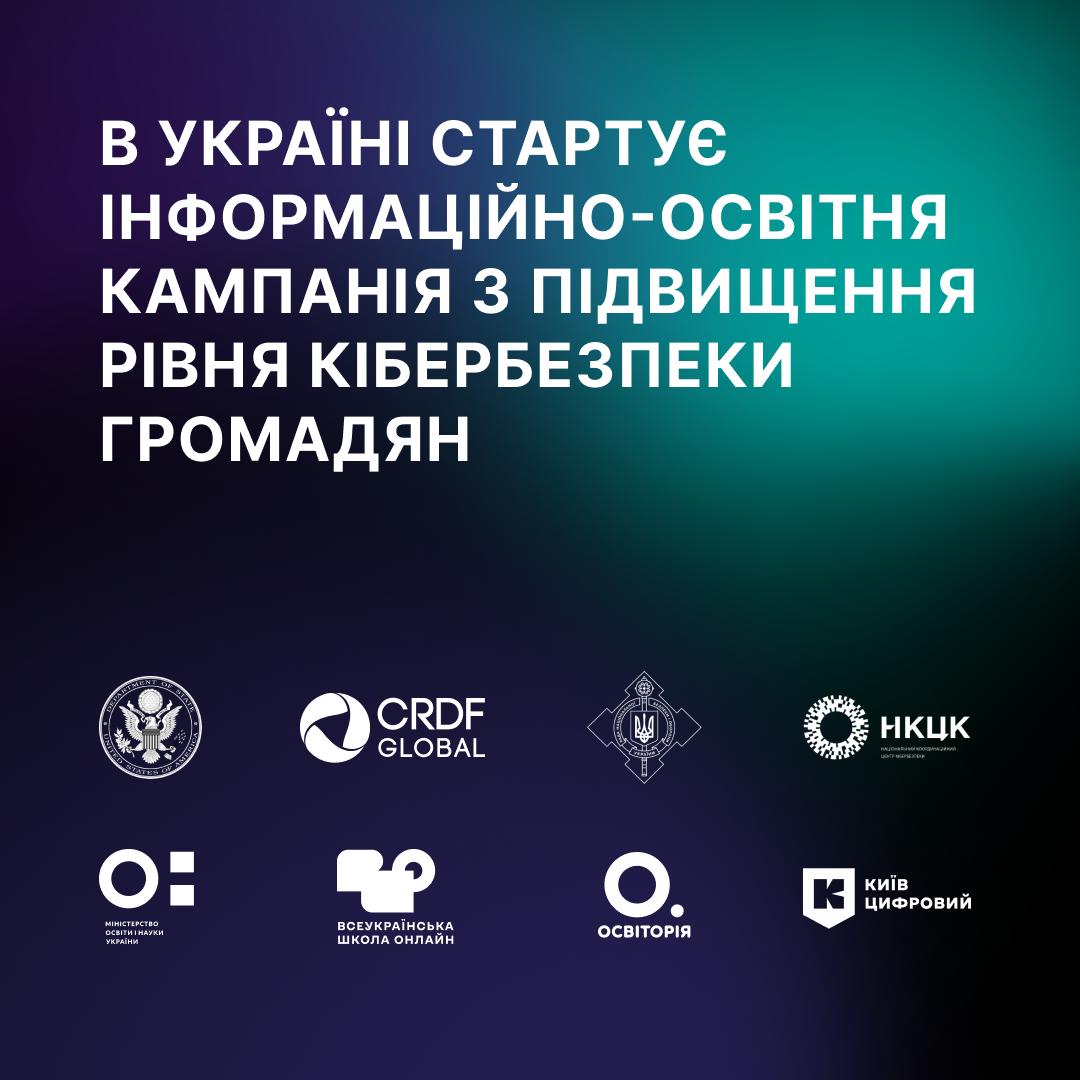Awareness-raising campaign to improve citizens’ cyber hygiene launched in Ukraine
The U.S. Foundation for Civilian Research and Development in Ukraine (CRDF Global in Ukraine), with the support of the U.S. Department of State, jointly with the National Coordination Centre for Cybersecurity at the National Security and Defence Council of Ukraine, the Ministry of Education and Science of Ukraine, the All-Ukrainian Online School, Osvitoria and Kyiv Digital, are launching a nationwide information and education campaign on personal cybersecurity.
 The main goal is to raise general awareness of online threats and teach Ukrainians the basics of cyber hygiene.
The main goal is to raise general awareness of online threats and teach Ukrainians the basics of cyber hygiene.
“We have been working to develop and improve cybersecurity for over 5 years and have been implementing a number of projects with Ukrainian partners. It is important to realise that cybersecurity is not a niche topic for professionals. It is a relevant matter for everyone with access to the Internet. Therefore, we are focusing our efforts on spreading the basics of cyber hygiene among Ukrainians, regardless of their age, gender or the needs they cover online”, – said Mykhailo Verich, CRDF Global Regional Director.
“Cybersecurity is an important component of Ukraine's national security and the collective security of the civilised world. And every citizen, regardless of social status or age, should take care of cybersecurity, as it directly affects not only personal security but also security in the country as a whole. Therefore, to raise awareness, inform people about potential cyber threats and provide them with the necessary skills to effectively reduce risks, we are launching this cyber hygiene information campaign”, – said Serhii Demediuk, Deputy Secretary of the National Security and Defence Council of Ukraine.
“Cybersecurity is a particularly relevant topic during a full-scale war. And it is very important to pay attention to it in schools. We see that many teenagers still consume a lot of content from russian bloggers and they are less protected from fraud and manipulation on the Internet. So, it’s very appropriate to introduce this topic into lessons, and it is studied as part of computer science and civics and history education. And it is necessary that the importance of cybersecurity is discussed not only in schools, but also at home or in the media”, – said Andrii Stashkiv, Deputy Minister of Education and Science of Ukraine.
The campaign is focused on several age groups:
- teenagers (11-17 years old) are among the most vulnerable - they use all technologies with much more confidence than most adults, but have less life experience and critical thinking, which makes them easier to fall for fraudsters;
- adults (18-59 years old) use technological innovations more selectively, but do not consider themselves interesting for cybercriminals, and therefore continue to neglect security rules;
- elderly people (60+), because since the beginning of the full-scale invasion, they are increasingly using online tools to receive news and communicate with their families, and therefore also need support and explanation of the rules of cyber
The campaign materials focus on simple and straightforward cybersecurity rules that people often fail to follow in everyday life: regularly changing passwords, checking the links that users click on, checking the reliability of the Wi-Fi network to which gadgets are connected. The basic principles of cyber hygiene, along with an interactive game to test your knowledge, are available here.
This is the second wave of the campaign to improve the cyber literacy of Ukrainians: the first one was successfully held from September 2022 to September 2023. To ensure a long-lasting and sustainable impact, the campaign is ongoing and is constantly being improved, adapting to new threats and engaging new netizens to create a safe online space in Ukraine.
The All-Ukrainian Information and Education Campaign to raise awareness of cyber threats and basic rules of cyber hygiene among the Ukrainian population is implemented by the U.S. Foundation for Civilian Research and Development in Ukraine with the support of the U.S. Department of State and with the assistance of the National Coordination Centre for Cybersecurity under the National Security and Defence Council of Ukraine and the Ministry of Education and Science of Ukraine, as well as with the information support of the All-Ukrainian Online School, Osvitoria and Kyiv Digital.